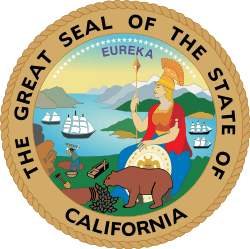William Morris Stewart
| William M. Stewart | |
|---|---|
 | |
| United States Senator from Nevada | |
|
In office February 1, 1865 – March 3, 1875 | |
| Preceded by | (none) |
| Succeeded by | William Sharon |
|
In office March 4, 1887 – March 3, 1905 | |
| Preceded by | James G. Fair |
| Succeeded by | George S. Nixon |
| 5th California Attorney General | |
|
In office 1854–1854 | |
| Preceded by | John R. McConnell |
| Succeeded by | William T. Wallace |
| Personal details | |
| Born |
August 9, 1827 Galen, New York |
| Died |
April 23, 1909 (aged 81) Washington, D.C. |
| Political party | Republican, Silver Republican (1893-1901) |
| Residence | Virginia City |
| Profession | Attorney |
| Religion | Roman Catholic |
William Morris Stewart (August 9, 1827 – April 23, 1909) was an American lawyer and politician.
Biography
Stewart was born in Wayne County, New York. As a child he moved with his parents to Trumbull County, Ohio. As a young man he was a mathematics teacher in Ohio. In 1849 he began attending Yale University but left in 1850 to move to California. Like many young men during that time, he came to California because of the Gold Rush. He arrived in San Francisco, California and soon left to begin mining near Nevada City, California. In 1852 he stopped mining and decided to become a lawyer in Nevada City. He almost immediately became a district attorney, and served as attorney general of California briefly during 1854, at the age of 27.
In 1860 Stewart moved to Virginia City, Nevada where he participated in mining litigation and helped the development of the Comstock Lode. As Nevada was becoming a state in 1864, he helped the state develop its constitution. Stewart’s role as a lawyer and politician in Nevada has always been controversial. He was the territory’s leading lawyer in mining litigation, but his opponents accused him of bribing judges and juries.[1] Stewart accused the three Nevada territorial judges of being corrupt, and he barely escaped disbarment.[2]
Political career
In 1864, Stewart was elected to the United States Senate as a Republican. He served in the Senate from 1865 until 1875 when he retired and practiced law again in Nevada and California. He was elected to the Senate again in 1887 and reelected in 1893 and 1899. During the 1890s he left the Republican Party to join the Silver Party, which supported the Free Silver movement.[3] He caucused with the Silver Republicans
During his many years in the Senate, Stewart drafted or co-authored important legislation, including several mining acts and laws urging land reclamation by irrigation. Most famously, Stewart is given credit for authoring in 1868 the Fifteenth Amendment to the United States Constitution protecting voting rights regardless of race, color, or previous condition of servitude. During his time as senator, Stewart received 50,000 acres of land for his service on the Committee on Pacific Railroads.[4] In 1871, President Ulysses S. Grant offered Stewart a seat on the United States Supreme Court. Stewart declined. Stewart was also involved in an international scandal where he promoted the sale of a worthless worked out Emma Silver Mine at Alta, Utah for millions of pounds to unsuspecting English citizens.[5]
Post political career
Stewart retired from the Senate in 1905. He was a co-founder of the city of Chevy Chase, Maryland, along with Francis G. Newlands, a fellow Senator from Nevada.[6] Stewart remained in Washington, D.C. and died there four years later. He was cremated and the ashes were originally kept in Laurel Hill Cemetery in San Francisco before being moved to Holy Cross Cemetery in Colma, California.[7] Note: According to the book Reminiscences of William M. Stewart (1908) in May 1905 he moved to the Bullfrog Mining District (Nevada) with his new wife and her daughter where he started a law firm and law library.
References
- ↑ Grant H. Smith, 1943, The History of the Comstock Lode, Univ. of Nevada Bulletin, v.37, n.3, p.69.
- ↑ Dan Plazak, 2006, A Hole in the Ground with a Liar at the Top, Salt Lake City: Univ. of Utah Press, ISBN 0-87480-840-5, p.26-27.
- ↑ U.S. Senate: Art & History Home > People > Senators > Senators Who Changed Parties During Senate Service (Since 1890)
- ↑ Faragher, John Mack (2006). Out of Many: A History of the American People, 5th Edition. Upper Saddle River, NJ: Pearson Prentice Hall. p. 505.
- ↑ E.G.D. (October 9, 1893). "New York Times". The New York Times.
- ↑ http://www.chevychasehistory.org/content/view/3/144/
- ↑ William Morris Stewart (1827 - 1909) - Find A Grave Memorial
- United States Congress. "William Morris Stewart (id: S000922)". Biographical Directory of the United States Congress.
His story was dramatized in an early episode of the TV western series, "Death Valley Days."
External links
- William M. Stewart, The Online Books Page, University of Pennsylvania
 Media related to William M. Stewart at Wikimedia Commons
Media related to William M. Stewart at Wikimedia Commons
| United States Senate | ||
|---|---|---|
| Preceded by (none) |
U.S. Senator (Class 1) from Nevada 1865–1875 Served alongside: James W. Nye, John P. Jones |
Succeeded by William Sharon |
| Preceded by James G. Fair |
U.S. Senator (Class 1) from Nevada 1887–1905 Served alongside: John P. Jones, Francis G. Newlands |
Succeeded by George S. Nixon |
| Legal offices | ||
| Preceded by John R. McConnell |
California Attorney General 1854 |
Succeeded by William T. Wallace |

